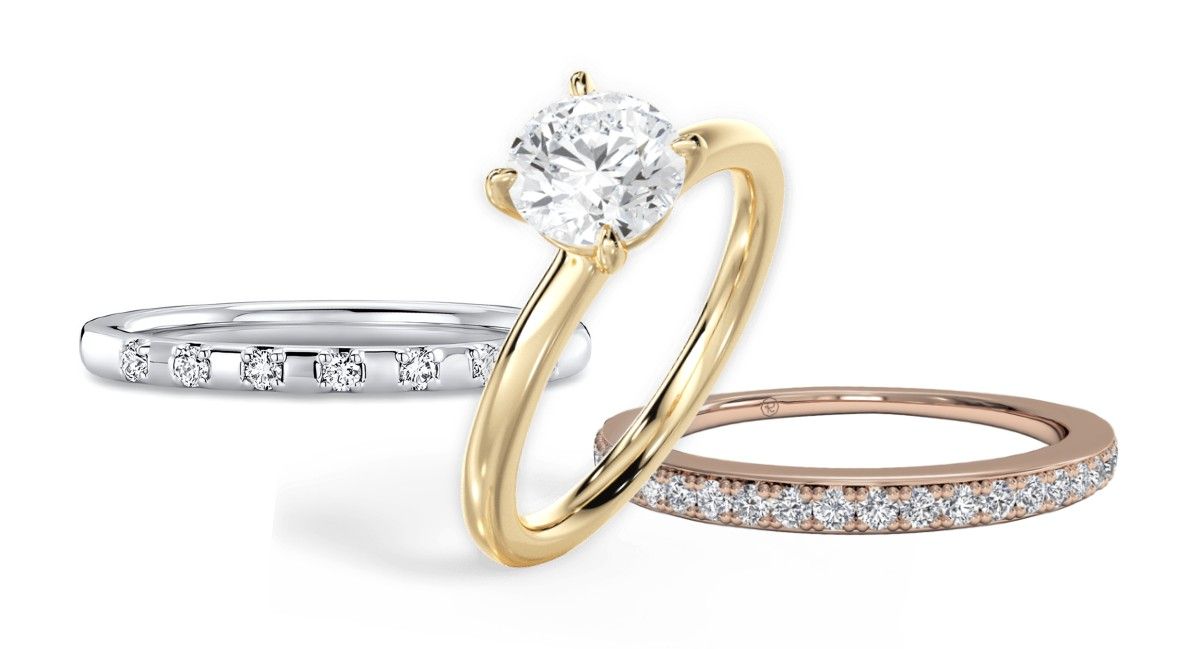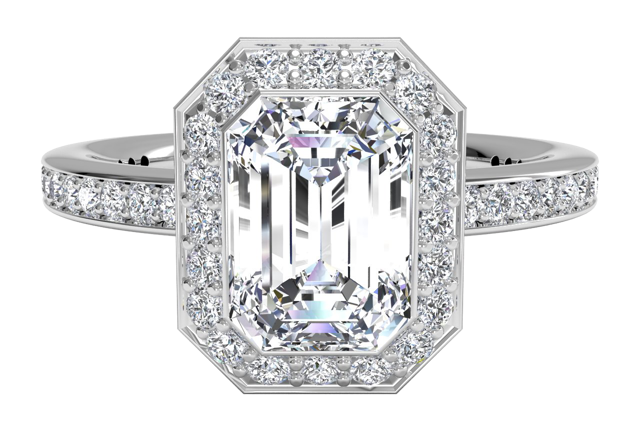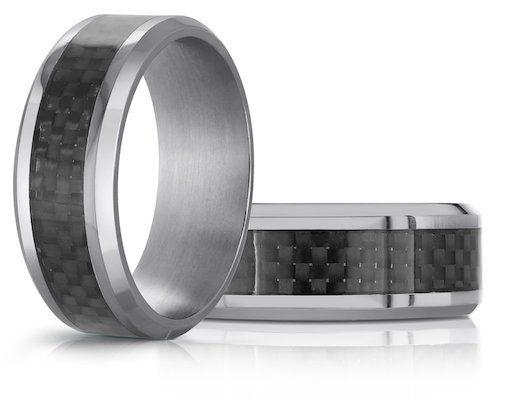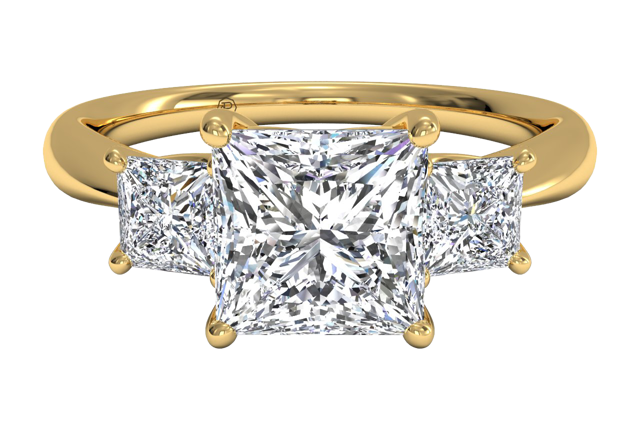Discover the Perfect Metal for Your Engagement and Wedding Rings

The essential elements that go into creating an engagement ring—the diamond, the setting, and the precious metal you select—all have considerable importance. During the engagement ring shopping experience, many place the most emphasis on the diamond and its setting; however, choosing a precious metal that suits your preferences, lifestyle, and budget is just as necessary. Selecting the right precious metal for your wedding rings is an equally important decision. Read on to learn about the different precious metals commonly used in engagement rings and wedding bands. Learning all about the attributes and qualities of these metals will help you and your partner make an informed decision so you can choose the rings that best represent your unique love story with no regrets.
Yellow Gold
Although many believe higher-karat gold is superior due to its higher value, it may not be the most durable option for your engagement and wedding rings. Due to its exceptional softness, jewelry made with pure 24-karat yellow gold is prone to scratches, bending, and gemstone loss. To bolster the strength of gold used for jewelry, gold alloys are created by blending pure 24-karat gold with other metals like copper and zinc for added strength and durability. Wedding bands are commonly crafted from either 14K gold, which contains 58.3% pure gold, or 18K gold, which contains 75% pure gold. Yellow gold wedding bands are extremely versatile and suit all skin tones, but they are especially complementary to warmer complexions. When choosing yellow gold for rings, there are some things to keep in mind. While it is generally low-maintenance, yellow gold requires occasional polishing and cleaning to maintain its luster. Like all gold alloys, it can be susceptible to scratches, particularly when exposed to hard surfaces. On the plus side, yellow gold offers an affordable option for wedding bands. 14K yellow gold is among the most budget-friendly choices for wedding bands, making it an appealing option for those seeking a timelessly elegant look without exceeding their budget.
White Gold
The dazzling brilliance and pure white hue of white gold has surged in popularity as a contemporary and versatile option for engagement and wedding bands. Its platinum-like allure is created by blending pure gold with metals such as nickel, silver, and palladium. It has even surpassed yellow gold as the preferred choice for wedding bands. Like yellow gold and rose gold, white gold is available in 14K and 18K, with 14K being the more resilient option. Renowned for its modern appearance, anyone can look great wearing white gold jewelry, although it is most complementary to those with cooler skin tones. White gold is alloyed with sturdier metals than yellow gold, enhancing its durability to some extent. Its bright hue makes a flattering backdrop for white, colorless diamonds, making it a superb choice for diamond engagement rings. However, it's essential to know that lower color-grade diamonds might display a more noticeable yellow tint when set in white gold.
It's crucial to note that white gold needs occasional rhodium plating to preserve its bright white color and sheen, making white gold jewelry a higher-maintenance metal compared to yellow and rose gold. Without periodic rhodium plating maintenance, white gold can begin to turn yellow. Rhodium plating is a straightforward and affordable process carried out by experienced jewelers. Another point to consider when selecting white gold for your jewelry is its nickel content, which may trigger metal allergies in some individuals with sensitive skin, especially with 14K white gold. If you have known sensitivities, it's advisable to explore alternative options or ensure that the white gold jewelry is nickel-free. Despite the need for occasional maintenance and the potential for metal allergies in some people, white gold remains a beloved choice for many. Its gleaming white color, durability, and ability to enhance the brilliance of sparkling diamonds make it a highly favored metal for engagement rings and wedding bands. White gold engagement and wedding bands also provide a sophisticated appearance at a more affordable price point than platinum.
*For individuals with sensitive skin, Ritani offers a hypoallergenic, nickel-free white gold alternative. Contact us to learn more.
Rose Gold
Rose gold offers a softer and warmer aesthetic, making it an exquisite choice for engagement and wedding ring metals. Created by combining pure gold with copper and silver, it results in an elegant pink color that stands out. Known for its warm and romantic appeal, rose gold is available in different purity levels, with 14K and 18K being the most popular. Its relatively high copper content also makes it an affordable option. Furthermore, rose gold beautifully complements all skin tones. However, it's important to be aware of one potential drawback: individuals with sensitive skin may need to exercise caution due to its copper content, which could pose a slightly higher risk of causing skin issues. If you have any concerns about possible reactions, it's advisable to consult with a professional jeweler or dermatologist. Overall, rose gold offers an eye-catching and delightful choice for rings due to its charming hue, durability, and affordability.
Platinum
Platinum is renowned for its rarity, making it a luxurious and exceptionally durable choice among precious metals. Historically, the scarcity of platinum during times of war contributed to the creation of white gold as an alternative. Platinum stands out as an excellent option for securely holding precious stones, ensuring their longevity. It is often used for prongs in rings made from less durable metals, like white gold. The resilience of platinum allows it to resist scratches and endure daily wear and tear effectively. Although platinum is more expensive than other metal options, it is incredibly durable, justifying its higher cost. Platinum bands are highly resistant to damage in everyday life, maintaining their color and ensuring you won't need to replace them, and their sheen will endure over time. Although rare, if platinum jewelry gets scratched or tarnished, a skilled jeweler can simply polish the pieces and restore them to their original shine. Moreover, platinum is a hypoallergenic metal, making it a superb option for individuals with sensitive skin.
If you have questions about which metal to choose or any other questions concerning diamonds and jewelry, feel free to get in touch with us today to chat with our customer concierge team. We also encourage you to explore our state-of-the-art engagement ring customizer, a convenient tool designed to help you create your dream ring right at your fingertips!


